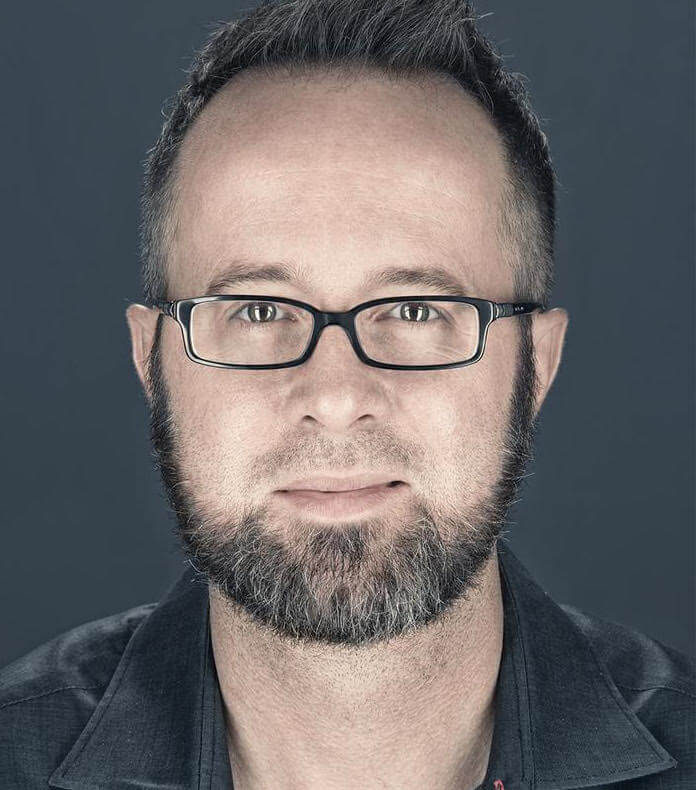Whurley on the Intersection of Creativity, Technology & Equality
Funk Bassist. IBM Master Inventor. Best Evil Genius . Chief Technology Officer. Gender Equality Advocate.
These are just a sampling of the titles earned by Whurley (born William Hurley) since graduating from a Texas high school in 1989. Whurley is now globally known as one of the pioneers in the open source software community, and as the visionary entrepreneur who founded mobile software design & development company Chaotic Moon Studios and Honest Dollar; a financial technology company that helps set up and maintain highly-customized Individual Retirement Accounts.
In March of 2016, Goldman Sachs announced a deal to acquire Honest Dollar and its industry disrupting platform.
Whurley currently spends his time as a lead developer in a project to make gender equality in technology a reality, a mentor to the next generation of coders and designers, and the father of two sons.
Tell us about your early life – where you grew up and the influences and experiences that crafted who you are today.
I was born in Manassas, Virginia. In my youth, my family moved around a lot, as my father was a member of the US Army Special Forces. We lived in Germany, Virginia and Arizona before settling in Texas, where I attended elementary school. Following my graduation from Temple High School in 1989, I took electronic music courses at Temple Junior College, which would be the extent of my college education.
“whurley” was originally Hurley’s Unix username when I was starting out in the open source community. It eventually turned into a “cult” brand and I began going by “whurley” professionally in 2002.
Your bio reflects a passion for music, including a few years as a bassist in a funk band. How did that love of music and creative expression translate into your work with coding and computing?
I think creating technology is exactly like creating music. Think about it, getting the various components to work together in unison, in tune, and in time. Music and coding are far more alike than most imagine. They are both an expression of creativity, and so entwined that these days technology is as much a part of music as it is any other part of our life.
What would we hear on your playlist if you had to go into deep focus mode for a project?
X Gon’ Give It TO Ya – DMX
Dumb It Down – Lupe Fiasco
Bad M.F. – Pharoahe Monch
The Jungle – Pharoahe Monch
Gorilla Radio – Rage Against The Machine
Tom Sawyer – Rush
Time Machine – Sweatshop Union
Geekin – Will.i.am
California Love – 2Pac
Hypnotize – The Notorious B.I.G.
What are the issues or causes you’re most interested in moving forward on a personal level? Where do you find an intersection between those causes and your current ventures?
Gender equality is a huge issue I’m very passionate about. In today’s connected world, the power of information and communication technologies (ICTs) to foster and catalyze inclusive development opportunities for girls and women is well recognized. Indeed, the full participation of women in the Information Society is necessary to ensure we as a global community move forward.
However, current statistics show that we have a long way to go in order to bridge the gender digital gap. Women are significantly left behind – yet women continue to be abused and harassed through digital technologies far more than men.
I’ll be announcing a new project in September to help make gender equality in technology a reality.
Where do you see opportunity for open source technology to have the greatest impact on our society, now and in the future?
I think open source has already made a tremendous impact and is now a baseline for things moving forward; from a software viewpoint. But from the viewpoint of researching some of the critical issues facing our society I feel that open data (the next evolution) has a very long way to go. Take cancer research for example. Many universities and corporations fiercely guard their research. How much closer to a cure would we be if all research data were open data? What impact could we make on other issues threatening the world?
What advice would you give the next generation of coders and developers looking to make a difference in the world?
Just do it. I always tell people that ask me for guidance that there is nothing special about me. The difference between me and everyone I meet that ask for mentorship is that I’ve done it. That I put in the time, that I didn’t listen to the voices of dissension around me, and that I followed my dreams like they were a compass. Most people lack the self-confidence to just do whatever it is they dream… that’s probably their biggest obstacle, and the thing I try to encourage them the most to address early as they are starting their careers.
